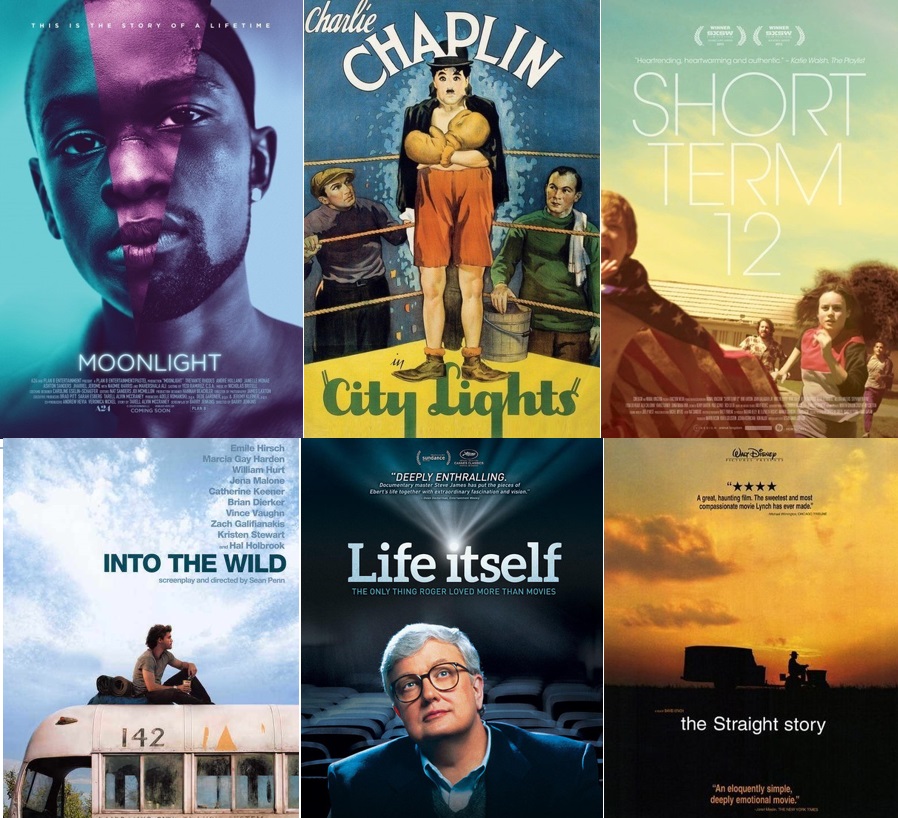To mark 2019’s Day4Empathy and the sixth anniversary of the passing of Roger Ebert, we have turned the site over to 13 reviews that reflect the concepts of this day and Roger’s belief in cinema as an empathy machine. For several years now, we have turned the site back over to Roger today, using it to celebrate his writing by republishing 13 of his reviews. This year, we’re doing it a little differently, illustrating how much Roger’s influence still impacts the way we review films by including a few pieces that reflect how those concepts have influenced what has been published in the years since his passing.
Documentaries are often a direct portal into lives other than our own. So it’s not surprising that four of today’s reviews are of non-fiction films, including works by three of Roger’s favorite filmmakers: Werner Herzog, Errol Morris, and Steve James. The fourth has a subject who actively worked toward a more empathetic world: Fred Rogers.
Chronologically, today’s celebration starts with one of Roger’s most famous reviews, his 1978 piece on Errol Morris’ “Gates of Heaven,” a review that impacted Morris’ career, other documentarians, and even film critics, who saw how Roger could use his influence to champion a “smaller” film he deemed important. It’s easy to point a camera at “oddballs” and laugh at their eccentricities, but Roger saw the empathy in Morris’ approach. He understood that the film was reaching for something greater than mere observation, noting, “There are many invitations to laughter during this remarkable documentary, but what ‘Gates of Heaven’ finally made me feel was an aching poignancy about its subjects.”
We chose another documentary that’s about death to highlight today but one at the other end of both its filmmaker’s career and Roger’s, Werner Herzog’s “Into the Abyss.” A documentary about life on death row, Herzog’s underrated film clearly moved Roger, and led him to comment on the filmmaker’s power to examine a tough subject not by editorializing but merely paying attention to his subjects. Roger writes, “Herzog never sensationalizes, never underlines, expresses no opinions. He listens.”

Reviews of two documentaries that have been released since Roger’s passing are also a part of today’s Day4Empathy celebration. We would be remiss to ignore the film in which Roger’s belief that cinema is an empathy machine is elucidated, Steve James’ “Life Itself.” Matt Zoller Seitz reviewed the film in 2014 and it’s a deeply personal, beautiful piece of writing, one that keenly illustrates how Seitz has worked to keep the vision of the site alive as both a tribute to its namesake and a continuation of his legacy. Seitz writes, “…when critics review films, they bring the sum of their intellectual capacity and life experience to bear, along with whatever drama (or comedy) they’re going through at that moment in time. ‘Life Itself’ gets this. Life itself, that loaded two-word phrase, is what Roger really wrote about when he wrote about movies.”
Finally, on the documentary front, we wanted to highlight a piece about a film and man that really defined compassion for so many people, Morgan Neville’s “Won’t You Be My Neighbor?” The film, which is playing at Ebertfest next week, was covered by Odie Henderson upon its release, and it’s another example of how the critics at this site work to emulate the personal approach of its founder. Odie gets to the core of why the film works and why Fred Rogers still matters: “Mr. Rogers made you feel like someone gave a damn about you. He said you were special. He did NOT, as the jackasses at Fox News and the Wall Street Journal claimed in hideous failure-blaming articles, promise you success or glory. He just told you that, no matter what you looked like, how able you were or how much money you had, that you had value.”
The concept of cinema as an empathy machine and how that influenced the way Roger Ebert appreciated movies isn’t the exclusive property of documentaries, and not something new to the form. In fact, they don’t even need sound. One of Roger’s Great Movies is a perfect example of this cinematic compassion, Charlie Chaplin’s “City Lights.” We’ve highlighted his 1997 essay today, in which he notes how the form of the silent film can feel even more transportive than modern movies: “Chaplin’s gift was truly magical. And silent films themselves create a reverie state; there is no dialogue, no obtrusive super-realism, to interrupt the flow. They stay with you. They are not just a work, but a place.”

Another filmmaker whose work often takes viewers to a “place” is David Lynch, although Roger had a notoriously unpredictable relationship with the filmmaker’s projects. He seemed to respond to Lynch more later in life, giving four stars to him the last two times he reviewed his work: “Mulholland Drive” and “The Straight Story,” which is undeniably a film about compassion. As Roger highlights in a perfectly crafted intro, “The first time I saw ‘The Straight Story,’ I focused on the foreground and liked it. The second time I focused on the background, too, and loved it. The movie isn’t just about the old Alvin Straight’s odyssey through the sleepy towns and rural districts of the Midwest, but about the people he finds to listen and care for him. You’d think it was a fantasy, this kindness of strangers, if the movie weren’t based on a true story.”
Roger Ebert always seemed to respond when he found truth in what a film was presenting to him. In a sense, being genuine and believable is a necessary component of the empathy machine. There’s no fuel for it without it. Take “Junebug,” about which Roger wrote, “’Junebug’ is a great film because it is a true film. It humbles other films that claim to be about family secrets and eccentricities. It understands that families are complicated and their problems are not solved during a short visit, just in time for the film to end. Families and their problems go on and on, and they aren’t solved, they’re dealt with.”
Five years before that review, Roger wrote a Great Movies entry for one of the most devastating movies of all time, Isao Takahata’s “Grave of the Fireflies.” Roger understood how animation could be utilized to create a different kind of cinematic empathy, one that requires both the creator and the audience member to meet somewhere in the middle. “Live action would have been burdened by the weight of special effects, violence and action,” he writes. “Animation allows Takahata to concentrate on the essence of the story, and the lack of visual realism in his animated characters allows our imagination more play; freed from the literal fact of real actors, we can more easily merge the characters with our own associations.”
Great films can often be a way to see true stories from a different angle. Take the tragic end of Chris McCandless, which had been reported in news stories around the world and recounted in Jim Krakauer’s excellent Into the Wild. There’s an undeniable compassion and understanding in director Sean Penn’s approach to telling the McCandless story in “Into the Wild,” and Roger picked up on that. He notes how the movie highlights a need for connection and extrapolates that Penn probably feels that now more than he did as an angry young man, although you can sense Roger himself feels the same thing. His praise of the film is almost a warning: “This is a reflective, regretful, serious film about a young man swept away by his uncompromising choices. Two of the more truthful statements in recent culture are that we need a little help from our friends, and that sometimes we must depend on the kindness of strangers. If you don’t know those two things and accept them, you will end up eventually in a bus of one kind or another.”

That same year, Ebert found another young person with whom to identify in a completely different place. He notoriously picked “Juno” as the best film of 2007, writing upon its release, “It is very smart, very funny and very touching; it begins with the pacing of a screwball comedy and ends as a portrait of characters we have come to love. Strange, how during Juno’s hip dialogue and cocky bravado, we begin to understand the young woman inside, and we want to hug her.”
The understanding of people unlike ourselves would continue in coverage of films released after Roger’s passing. It’s so tempting to say “Roger would have loved X,” but few films could better fill that spot than “Short Term 12,” 2013’s masterful drama that appears now to be one of the best showcases of young talent of the ‘10s (two of its stars, Brie Larson and Rami Malek, have won Oscars since it was released and two more, Lakeith Stanfield and Kaitlyn Dever, look like they easily could someday too). As there was in the way Roger approached cinema, there’s a reflection in Christy Lemire’s review that compassion and empathy require honesty. She writes, “Instead, ‘Short Term 12’ comes from a place of delicate and truthful understatement, which allows the humanity and decency of its characters—and, yes, the lessons—to shine through naturally.”
One of the best films of the ‘10s is typically recognized as such because of the compassion we have for its characters and the empathy its brilliant director engenders in them. When I saw “Moonlight” at TIFF in 2016, I was transported in ways few films have in my lifetime, and, again, it’s because of the truth presented by its creator. I concluded my review in a way that reflects the themes of the Day4Empathy, “… Jenkins knows he’s laid the groundwork, trusts his actors and allows the emotions of what’s unsaid to provide the dramatic thrust—that ‘Moonlight’ makes its greatest impact. Jenkins deeply understands that it is human connection that forms us, that changes our trajectory and makes us who we are.”
Finally, we wanted to highlight a piece of writing on one of the best films of 2017, Odie Henderson’s coverage of Dee Rees’ “Mudbound.” The power of Rees’ film is undeniable, and it clearly connected with Henderson, who writes, ““Mudbound” is all about perception. How it can foster empathy and engender contempt, sometimes in the same person. How it can cause one man to look at his land with life-affirming pride and another man to see that same plot as the kiss of death. How an act of wartime courage involving a red-tailed plane and a dark-skinned pilot can forever alter one’s opinion of a different race. And how a society can impose unfair, harmful and absurd restrictions on an entire group simply because those people are seen as inferior by the powers that be. The film invites us to observe its characters, to hear their inner voices, to see what they see and to challenge our own preconceived notions about race and gender.”
Hearing the inner voices of others—this is the power of truly great cinema. And it was a power that Roger’s writing unlocked for generations. On this Day4Empathy, we celebrate his work and those who continue to exemplify the same beliefs.












